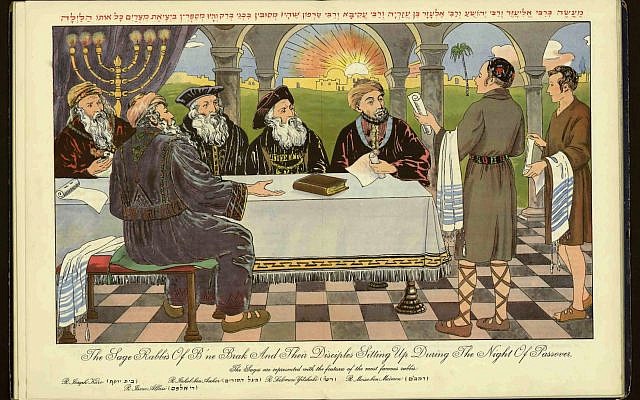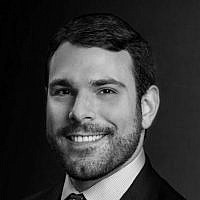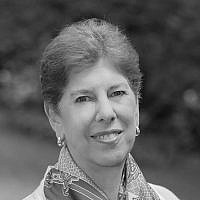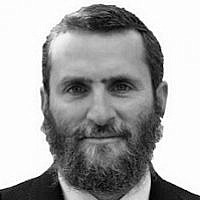Imagining a world without Jews

What would a world without Jews look like?
That’s a question I’ve posed to hundreds of young adults grappling with Jewish identity over my years as a rabbi for graduate students. Most are proud of being Jewish but have difficulty putting their finger on why Judaism should play any significant role in their lives. And in order to appreciate something, it’s always helpful to consider what life would be like without it.
A world without Jews. There seem to be a lot more people today, especially around campuses I frequent, who like the sound of that.
It’s a world that’s hard to imagine, kind of like it’s hard to imagine how we got places before Waze (made in Israel, by the way–so there’s one thing we can cross out). But the opening lines of the Passover Haggadah provide us some help. There we encounter an audacious assertion:
“If the Holy One, blessed be He, had not taken our ancestors out of Egypt, then we, our children and our children’s children would still be enslaved to Pharaoh in Egypt.”
At first glance this statement appears mere hyperbole, so most people gloss over it. (Also, they’re hungry.) Surely we’re not really suggesting that you and I would still be stomping straw into mud bricks by the Nile thousands of years later.
But could it be possible that, in fact, this is exactly what we are suggesting?
I believe the Haggadah is engaging us in a thought experiment: Imagine a world where the Israelites had never been liberated from Egypt’s bondage. Such a scenario would not merely impact that one historical period but would fundamentally alter the trajectory of human civilization. Judaism, as we understand it today, would not exist. But more critically (as the late Rabbi Jonathan Sacks discussed extensively in his writings on Passover), the foundational ideas that Judaism eventually bestowed upon the world would have remained dormant or perhaps never arisen.
The Exodus narrative crystallizes what Genesis Ch. 1 introduced: that each and every human being is created in the image of God; i.e., a reflection of the Infinite with infinite potential. This revolutionary concept, central to all of Judaic thought and tradition, birthed the radical notions of intrinsic human dignity, self-determination and worth – notions that resonated through the corridors of Western civilization and continue to shape moral consciousness.
Through retelling the Passover story each year, the Jews taught the world that God cares about human suffering and intervenes in history to right moral wrongs, sometimes through miracles which transcend the natural order. Indeed, the Jewish story undergirded the very idea that time progresses at all—that there is a destiny and purpose to human existence beyond mere survival, that the long arc of history bends towards justice—all these game-changing concepts trace to the Exodus experience and the Jewish People that emerged from it.
Without the Exodus, human consciousness could have remained morally and ethically static, cryogenically frozen as of 1300 BCE. There would have been no Christianity, no Islam, no Scientific Revolution, no American Revolution. And no one to argue that slavery is wrong. Whether in bondage to this Pharaoh or that, the basic premise of Life would have remained exactly the same as it ever was, and always was to be. And that’s why, when the authors of the Haggadah asserted centuries earlier that we would have still been slaves today—they meant it.
There are still many in our time whose worldviews resist this central message of Passover, and they are gaining traction. They, like Pharaoh, believe that life is a zero-sum game. That nothing is sacred. That humanity is irredeemable and thus people we dislike are disposable. That this world is doomed, so we might as well behave as though it is. These voices can be heard everywhere, especially on campus. They represent many ideologies, but interestingly they tend to agree on not liking Jews or the Jewish State very much.
Not surprisingly, in perhaps the ultimate pre-Exodus retrogression, at least one freed Israeli hostage has reported literally being sold on the streets of Gaza.
Make no mistake: modern Israel’s struggle with her enemies is not primarily over territory, ethnicity, or even religion. Nor is it her struggle alone. It is rather a distillation of the clash of fundamental values between those societies who strive, sometimes imperfectly, to uphold the ethical imperatives rooted in our shared spiritual heritage, and between those societies moved by intolerance, chauvinism, nihilism, and brutality.
The authors of the Haggadah knew this struggle well. The text goes on to prophetically proclaim: “In every generation, there are those who will rise up against us to wipe us out.” I too know the struggle: my first cousin Debbie and her husband Shlomi Mathias were peace activists, but that didn’t stop Hamas from murdering them in front of their young son on October 7.
Rather than continually playing defense in its public relations (“See? It really wasn’t us who bombed that hospital, we promise!”) it would serve the Jewish State well to remind the global community and kids on campus that they have a choice of supporting a) a world free of Jews, or b) a world free of Hamas, Hezbollah, Houthis, and their benefactors in Tehran. Which world would you rather live in?
“And the Holy One, blessed be He, saves us from their hand.” May it be Your will.



